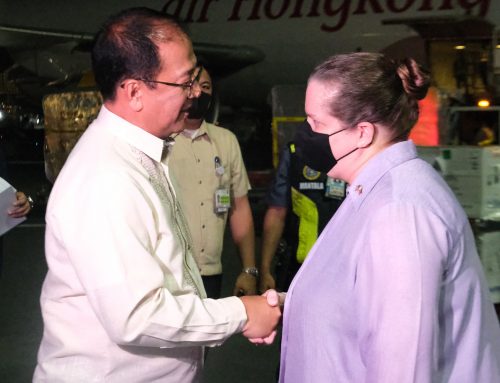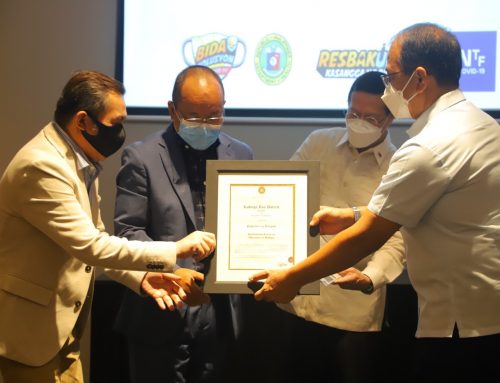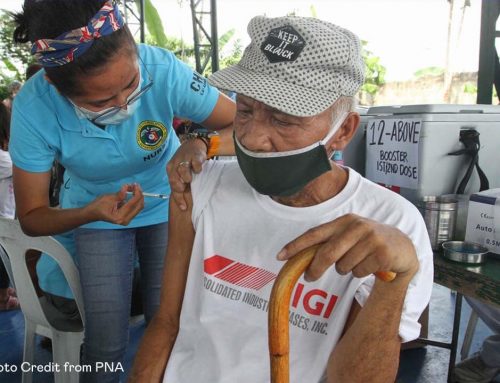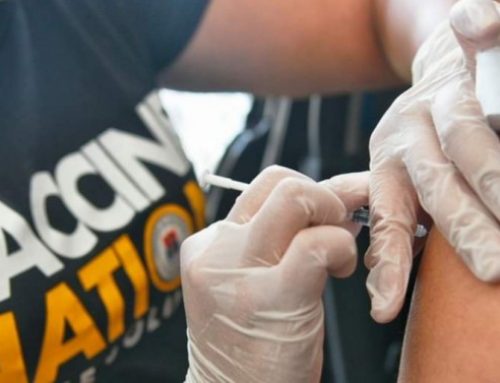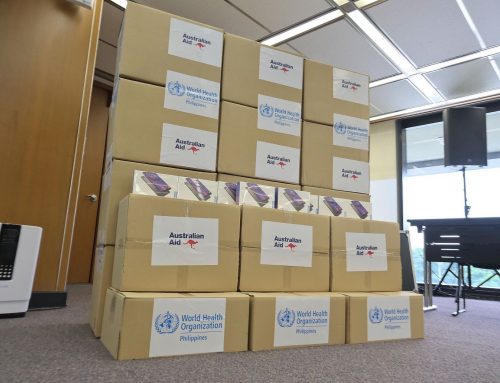PASIG CITY (03 February 2021) — As the Philippines prepares for the arrival and roll-out of the first batch of COVID-19 vaccines this February, the government underscored the need to continue the strict observance of health protocols to protect the Filipino people’s health.
National Task Force (NTF) against COVID 19 Chief Implementer and vaccine czar Secretary Carlito Galvez Jr said that even after getting vaccinated, people will still need to follow minimum health guidelines especially in public areas until 2022.
“Ang kailangan po talaga ay vaccine plus. Ibig sabihin after the vaccine, nariyan pa rin po ang strict [observance] minimum health standards — ‘yung social distancing, wearing of [face] masks and face shield, at ‘yung [practice] personal hygiene,” Galvez in a virtual public briefing on Wednesday.
“Kailangan pong panatilihin natin ‘yon kasi ang pinaka-protection natin. ‘Yung vaccine po kasi added protection po ‘yan pero main defense pa rin po natin ang compliance sa minimum health standards,” he added.
According to Galvez the Inter-Agency Task Force on Emerging Infectious Diseases and the NTF will discuss with the Commission on Elections (COMELEC) the proposed prohibition of face-to-face campaigns for the 2022 elections.
He said that such mass gatherings pose a major health risk to the public, as it would be difficult to observe minimum health protocols.
“Malaki pong challenge and risk and pagkakaroon ng face-to-face crowd gathering. Nakikita natin ang pagkampanya will enhance close contact with different people. Kaya we will discuss this with COMELEC later,” he said.
Vaccine roll-out
The vaccine czar said that the initial vaccine roll-out in the first quarter of this year will start two to three days after the arrival of the vaccines and will be administered in major public hospitals.
He said that the 117,000 Pfizer-BioNTech vaccines, which will be provided through the COVAX facility, will be used to inoculate health workers from the Philippine General Hospital, Philippine Lung Center, East Avenue Medical Center, and Dr. Jose N. Rodriguez Memorial Hospital in Caloocan.
Galvez explained that as the initial delivery of Pfizer-BioNTech vaccines from COVAX will cover only around 58,000 health workers, the government will prioritize those hospitals and healthcare facilities which are COVID referral hospitals or have attended to a large number of COVID-19 patients.
However, he committed that all healthcare workers from public and private facilities will be inoculated, as around three million AstraZeneca vaccines from COVAX facility will be delivered within the first quarter.
Meanwhile, Department of Health Undersecretary Maria Rosario Vergeire reminded implementing agencies of the national inoculation program to ensure that the wastage of vaccines should be avoided, or should be “as minimum as possible”.
“Meron po tayong tinatala na acceptable [wastage] na 5%. Ine-estimate na po namin ‘yan kapag kumukuha po tayo ng estimated number na kailangan na bakuna. Pero dapat we have to keep it as minimum as possible,” said Vergeire.
“Alam po natin na bawat dose ng bakunang ito ay napakahalaga sa lahat sa atin sa ating bansa because of the shortage in supplies,” she added.
Vergeire explained that the wastage of vaccines can happen in three ways.
First, is when a registered and eligible vaccine recipient who has been scheduled for inoculation on a specific day failed to show up.
Second, is when a registered and eligible vaccine recipient turned out to be ineligible on the day of vaccination due to underlying medical conditions.
“If we cannot find somebody else to take on the vaccine [allotted for the scheduled recipient], this will be a wastage,” she said.
The third cause of vaccine wastage is the manner in which the vaccines were stored, handled, and administered.
“We have to remember na ang bakuna po like Pfizer, ito po ay multiple doses in a given vial. So kapag hindi po tama ang pagbibigay ng ating mga healthcare worker o tama ang pagpre-prepare, maaaring magkaroon din ng wastage on that,” Vergeire explained.
The undersecretary emphasized that the preparations to be undertaken by concerned agencies, local government units, and cold storage facilities prior to the vaccine roll-out will be crucial, as these measures will prevent wastage.
“Kailangan preparado po ang ating mga facilities to store the vaccines properly. We need to provide and prepare the vaccines properly para po walang nasasayang na doses. Kailangan din po na ready ang mga distribution kits natin para di po nasisira ang bakuna kung saka-sakali sa distribution phase masira,” Vergeire said.
“At kailangan din na may ready tayong alternative recipients kung sakaling during that day of vaccination mayroon tayong mare-reject because of a medical condition o merong hindi dumating sa appointment na ‘yun. Dapat meron po tayong handang ipalit agad para di masayang ang bakuna,” she added. END



